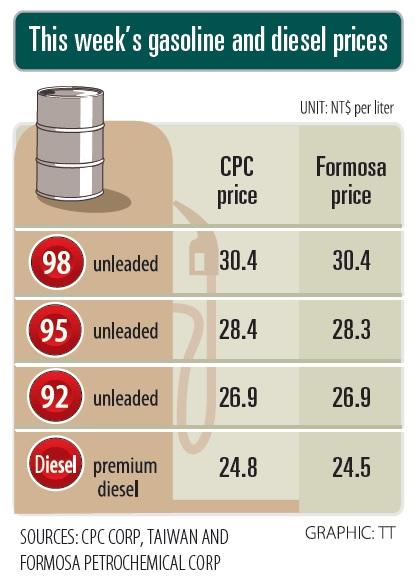CPC Corp, Taiwan (CPC, 台灣中油) yesterday said it has no plan to stop the sale of 92-octane unleaded gasoline, rejecting local media speculation of such a move to counter air pollution.
“Domestic supplies of 92, 95 and 98-octane unleaded gasoline are subject to market demand, and the 92-grade is still used by a certain portion of consumers,” CPC vice president Ann Bih (畢淑蒨) said in a statement posted on the company’s Web site.
SALES BREAKDOWN

Based on the state-run refiner’s statistics, the breakdown for unleaded gasoline products in Taiwan shows that 92-octane unleaded accounts for 20 percent of sales, 95-octane unleaded for 75 percent, and 98-octane unleaded for 5 percent, CPC said.
CPC guarantees it would continue providing a sufficient supply of the above-mentioned gasoline products, the statement said.
The company’s remarks came after the Chinese-language Commercial Times yesterday reported that CPC recently conducted an evaluation regarding whether to suspend the sale of 92-octane unleaded gasoline, in light of the worsening air pollution and the government’s plans to ban sales of motorcycles and cars with engines powered by fossil fuels in 2035 and 2040 respectively.
As the 92-octane product is less desirable than its 95 and 98 peers from an engine efficiency standpoint, CPC might consider stocking only the latter two at stations, the newspaper said.
POTENTIAL IMPACT
However, since 92-octane unleaded gasoline is mostly used by motorcycles and scooters, whose owners are mainly students and workers, and its price is NT$1.5 less than the 95-octane fuel per liter, CPC will need more time to consider the potential impact on this segment of consumers and might not implement the policy soon, the report said.
Moreover, any decision to stop the sale of 92-octane unleaded gasoline would need approval from the Ministry of Economic Affairs’ Bureau of Energy, the newspaper said.
FUEL PRICES
Separately, CPC yesterday announced domestic fuel prices are to rise this week for a fourth straight week, as sentiment in the global crude oil market last week remained cautious about the political situation in Iran and US crude oil inventories continued to decrease.
CPC said that its average cost of crude oil increased by US$1.26 per barrel to US$65.72.
This meant it had to increase gasoline and diesel prices by NT$0.2 per liter from today after factoring in the New Taiwan dollar’s appreciation of NT$0.323 against the US dollar, the refiner said.
Global crude prices also rose due to the increased fuel demand in the US amid cold weather, said Formosa Petrochemical Corp (台塑石化), which on Saturday announced similar hikes, effective from today.

POWERING UP: PSUs for AI servers made up about 50% of Delta’s total server PSU revenue during the first three quarters of last year, the company said Power supply and electronic components maker Delta Electronics Inc (台達電) reported record-high revenue of NT$161.61 billion (US$5.11 billion) for last quarter and said it remains positive about this quarter. Last quarter’s figure was up 7.6 percent from the previous quarter and 41.51 percent higher than a year earlier, and largely in line with Yuanta Securities Investment Consulting Co’s (元大投顧) forecast of NT$160 billion. Delta’s annual revenue last year rose 31.76 percent year-on-year to NT$554.89 billion, also a record high for the company. Its strong performance reflected continued demand for high-performance power solutions and advanced liquid-cooling products used in artificial intelligence (AI) data centers,

SIZE MATTERS: TSMC started phasing out 8-inch wafer production last year, while Samsung is more aggressively retiring 8-inch capacity, TrendForce said Chipmakers are expected to raise prices of 8-inch wafers by up to 20 percent this year on concern over supply constraints as major contract chipmakers Taiwan Semiconductor Manufacturing Co (TSMC, 台積電) and Samsung Electronics Co gradually retire less advanced wafer capacity, TrendForce Corp (集邦科技) said yesterday. It is the first significant across-the-board price hike since a global semiconductor correction in 2023, the Taipei-based market researcher said in a report. Global 8-inch wafer capacity slid 0.3 percent year-on-year last year, although 8-inch wafer prices still hovered at relatively stable levels throughout the year, TrendForce said. The downward trend is expected to continue this year,

Vincent Wei led fellow Singaporean farmers around an empty Malaysian plot, laying out plans for a greenhouse and rows of leafy vegetables. What he pitched was not just space for crops, but a lifeline for growers struggling to make ends meet in a city-state with high prices and little vacant land. The future agriculture hub is part of a joint special economic zone launched last year by the two neighbors, expected to cost US$123 million and produce 10,000 tonnes of fresh produce annually. It is attracting Singaporean farmers with promises of cheaper land, labor and energy just over the border.

US actor Matthew McConaughey has filed recordings of his image and voice with US patent authorities to protect them from unauthorized usage by artificial intelligence (AI) platforms, a representative said earlier this week. Several video clips and audio recordings were registered by the commercial arm of the Just Keep Livin’ Foundation, a non-profit created by the Oscar-winning actor and his wife, Camila, according to the US Patent and Trademark Office database. Many artists are increasingly concerned about the uncontrolled use of their image via generative AI since the rollout of ChatGPT and other AI-powered tools. Several US states have adopted